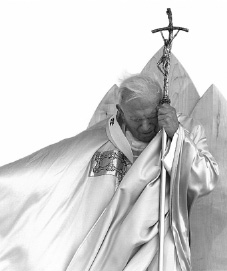John Paul II
Pope John Paul II, a colossus of the Catholic church, died on April 2nd 2005, aged 84
LONG before he died, the world was counting down the last days of Pope John Paul II. Each month he grew frailer, shrivelling inside the carapace of his white robes, his limbs trembling more violently, his ceremonial cross apparently all that kept him standing. Yet that, he believed, was the point. God kept him working, insisted on it, whatever the state of his body. And not just working at a desk like Pius XII, sustained by hot milk, but flying to India, Brazil and Africa, preaching to anyone who would hear him. Even his last trip, to Lourdes in August, was not for healing but to proclaim Our Lady’s love. In each new country his first act, after stepping from the aircraft, was to kiss the earth. When his body no longer let him, as in Cuba, the earth was raised on a tray to him.
His body took punishment all through his life. In 1981 he was shot by a would-be assassin; in 1992 a tumour the size of an orange was cut out of his gut. He skied until he was made an archbishop, and swam well into old age. Such vigour was one of his most welcome qualities when, as Karol Jozef Wojtyla, he was made pope in 1978. His Polishness made him a curiosity of papal history. But it was his moral, physical and intellectual strength that commended him. His predecessor John Paul I, an amiable but delicate man, had died soon after his election, and the Catholic church itself was close to disarray. The reforming zeal of the Second Vatican Council had run into the sand; churches were emptying, vocations falling, and Paul VI’s encyclical condemning birth control, “Humanae Vitae”, had driven millions of devout western Catholics to furtive disobedience. The second Pope John Paul offered a vigorous return to certainty.
It was not always the sort Catholics wanted. Above everything, Pope John Paul was an authoritarian and a centraliser. On bishops and laymen tentatively starting, after Vatican II, to organise things their own way, he strenuously imposed obedience to the diktat of the Holy See. Compromises worked out on the ground to respect the cultures of Africa or Latin America tended to die in dim offices in Rome, stifled by the men in black or red. Having helped to defeat communism in eastern Europe, Pope John Paul spent his next years attacking consumerism and capitalism for the similar illusions they offered.
Within the church itself, dissenters were harshly silenced. Prickly or distasteful issues – the ordination of women, the celibacy rule for priests, paedophile scandals among American clergy – were either ignored or put aside. Pope John Paul considered that church teaching on these topics was simple and right, and that rules set by popes before him were not to be overturned simply because the fecklessly modernising world had shifted once again.
Over the 26 years of his papacy, Catholics were increasingly torn between wishing that, by his going, he would let the church breathe, and loving the uncompromising faith he represented. The young, in particular, seemed drawn to that, and he to them, almost feeding off their energy in his last years. But many Catholics found the world too complex for this pope, and his formidably intelligent encyclicals both inspiring and impossibly demanding.

The church Pope John Paul treasured and promoted was essentially the one he had known in Poland. He was born in 1920 in the town of Wadowice to a mother who died young and a father who first sowed the idea of priesthood in him, making him study in a cold room to improve his concentration. He began his priestly training, in 1942, in an underground seminary kept secret from the Nazis; after his ordination, in 1946, he worked in a church that was a brave alternative to atheistic secular power. Priests were heroes, and the ordinary people, making acts of political defiance as much as faith, went to Mass, communion and confession with a frequency already dying out in western countries. Some of Pope John Paul’s most admirable acts were speeches made to oppressed peoples, within earshot of their leaders, appealing to them to treasure their human rights and agitateto be free. He did this in Chile, Cuba and the Philippines, as well as in communist Poland.
This was also a pope who could spring surprises. He was good at ecumenism, visiting both synagogues and mosques. As a Pole from a town once full of Jews, he felt a special obligation to respect them, and was the first pope to push a folded prayer-note between the stones of the Wailing Wall in Jerusalem. In 2000, startlingly, he read out a long apology for the church’s bad behaviour over the centuries. Some noted that it was church members, not the church itself, for whom he apologised. Nonetheless, it was a rare marvel that a man so certain of the church’s possession of the truth should criticise those who had believed it with equal fervour, but had taken things a bit too far.
The most frequent surprise, however, was the strength of spirit – of soul, he would say – that kept him going. He carried on largely in order to display, to a cynical world, the power of God at work in him and the needlessness of the fear of death. Now that he has been called back to source, his bruised and worried church feels, more than anything, the lack of his confidence.